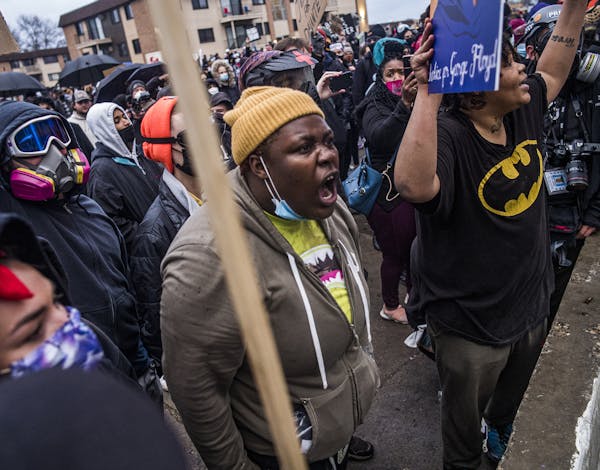In a push for sweeping police reforms following the killing of Daunte Wright, the mayor of Brooklyn Center on Saturday unveiled a series of proposals to remake the city's police force with more independent oversight, restrictions on when officers could make arrests and the use of unarmed civilians to handle minor traffic violations and mental health calls.
The move comes less than a month after Wright, a 20-year-old Black man, was shot by Kimberly Potter, a white police officer who, according to law enforcement officials, mistook her gun for a Taser after making a traffic stop for expired tags.
"I just want to get to work before there's another killing in our city," Brooklyn Center Mayor Mike Elliott told the crowd Saturday at City Hall.
The resolution was originally scheduled for a vote on Saturday, just days after other City Council members learned of its existence, but was pushed back one week after some of them pleaded for more time.
The proposal potentially could have changed the outcome of Wright's encounter with police, since it touches on how police conduct traffic stops and the way they should respond to the kind of non-felony warrant that led officers to attempt to arrest Wright.
Voicing concerns
The plan drew both support and skepticism, including from a former law enforcement official asked to speak at Saturday's meeting. Thomas Thompson, a former Ohio police officer, implied he would have concerns about unarmed people making traffic stops, which he said are among the most dangerous things that police do.
"I would really talk through that one," he said.
The resolution was accompanied by a fact sheet from Mayor Elliott that said Brooklyn Center police arrest Black people far more often than white people. In 2018, for example, police arrested Black people for marijuana possession at 15 times the rate of white people, according to the mayor's count. In the same year, police arrested Black people for disorderly conduct at 10 times the rate of white people.
The Brooklyn Center Police Department declined to comment, but one law enforcement official said the plan raises questions for him about cost and feasibility.
When it comes to unarmed civilians making traffic stops, for example, "What does that model look like?" asked Jeff Potts, executive director of the Minnesota Chiefs of Police Association.
In a letter issued last week, Brooklyn Center police union president Chuck Valleau said officers are ready to talk. "Our union members are willing to participate in any forum, meeting, or discussion with our community that is permitted by our city administration to help improve our relationships with Brooklyn Center residents," Valleau wrote. He said Wright's death has been devastating for the community and for police.
The mayor's proposal should be seen as "a historic first step," said Jaylani Hussein, executive director of CAIR-Minnesota.
"We never aspire for these things to be a silver bullet against police brutality, but there are measures that will reduce harm and do justice in ways that our communities can be valued and public safety can actually focus on doing less harm and not more harm," he said.
Civil rights attorney Nekima Levy Armstrong said it's right for the mayor to take "bold action" in light of Wright's death, but noted that racial profiling is the larger problem when it comes to traffic stops and will take more work to fix.
The City Council has held several listening sessions since Wright's April 11 death and used those comments to guide the drafting of the public safety plan, Elliott said. The plan doesn't specify how it would meet its objectives — instead, it would create a committee of citizens and experts appointed by the mayor to hash out details on costs, job descriptions and how civilian oversight would work.
Elliott said he would like Brooklyn Center to adopt some of the reforms he's seen in other cities including Eugene, Ore., where an unarmed mental health group that works with police responds to thousands of nonviolent mental health calls.
The resolution is named after Wright and Kobe Dimock-Heisler, a 21-year-old man with autism who was killed by Brooklyn Center police during a 2019 welfare check.
"The time for police reform was yesterday," said Amity Dimock, Dimock-Heisler's mother, adding at Saturday's meeting that her son would be alive today if unarmed responders took mental health calls rather than police.
The plan calls for a "Community Response Department" to dispatch social workers and trained mental health staff rather than police to certain calls, and to give unarmed staff the job of handling minor traffic violations.
A committee that includes people who have been arrested or detained by Brooklyn Center police would create a permanent civilian oversight board.
Citations, not arrests
The plan also instructs police to issue citations instead of making arrests for any non-moving traffic infraction or non-felony warrant or offense.
The Brooklyn Center proposal mirrors conversations taking place at the state Legislature and nationwide, and Minneapolis leaders are also considering creating an unarmed traffic safety division.
"There's been a lot of talk about 'Are there other ways to handle these mental health calls?' " said Potts, of the Minnesota Chiefs of Police Association. "Most chiefs are open to that idea."
Law enforcement officials are looking at some of the same issues, he said — the chiefs of police association is developing a best practices guide based on how various departments respond to mental health crises.
"I don't know that there's a single model in Minnesota that will be the way to do this," he said.
Matt McKinney • 612-673-7329
Body camera video shows Minnetonka man shooting at deputies several times before dying in firefight
Charge: Driver going 77 mph ran red light, fatally hit man crossing St. Paul street and kept going
Minnesota Senate GOP files ethics complaint against Sen. Nicole Mitchell
High school archer focuses on target: another national championship

